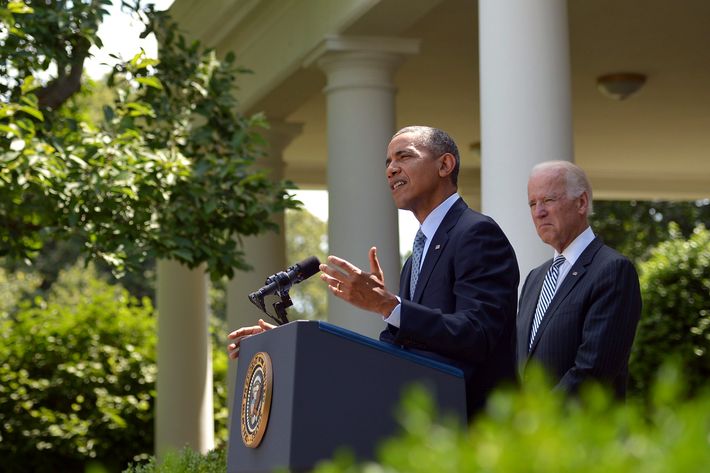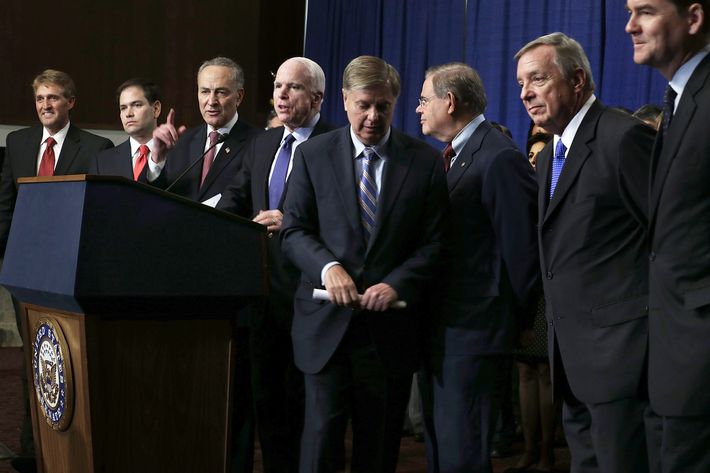
The Obama years have taught us the sometimes frightening lesson that our Constitution and legal structure alone don’t secure the Republic. We also depend on norms — or an implied understanding of what sort of behavior is acceptable. Liberals have given this problem special attention, as Republicans have carried out most of the norm-violating. It turns out to be perfectly legal for a party that controls just one wing of Congress to announce that, unless the president offers up ideological concessions, they will unleash a potential worldwide economic calamity. There is likewise nothing in the Constitution stopping the opposition party from blocking any nominee at all from running an agency merely because they disagree with the (duly passed) laws that agency carries out.
President Obama’s plan to effectively legalize millions of unauthorized immigrants, the outlines of which have been widely reported, rests on solid legal foundations. The legal basis for Obama’s plan is that the president has wide latitude to use the federal government’s scarce immigration law enforcement resources as he sees fit. Obama could announce that the president will stop pursuing some 5 million legal immigrants and grant them some kind of work visas. Having failed to persuade Congress to change the law, he will effectively have suspended it on his own.
Ross Douthat argues that Obama’s reported action, while legal, is nonetheless unfair and sets a dangerous precedent. Douthat opposes the ends of Obama’s plan as well as its means. I fully support Obama’s immigration policy goals. But the defenses of Obama’s methods seem weak and short-sighted.
To imagine how this method might be dangerous, you have to abstract it away from the specific end it advances and consider another administration using similar methods for policies liberals might not like. What if a Republican president announced that he would stop enforcing the payment of estate taxes? Or suspend enforcement of regulations on industrial pollution? Or laws on workplace discrimination against gays and lesbians?

Supporters of Obama’s forthcoming immigration measures have made several defenses of his methods:
1. He’s just prioritizing. Today’s New York Times editorial page, scoffing at Douthat’s argument without deigning to cite him by name, insists Obama would be merely prioritizing. “For Mr. Obama to use the tools at hand to focus on high-priority targets — felons, violent criminals, public-safety and national-security threats — and to let many others alone,” the Times assures us, “would be a rational and entirely lawful exercise of discretion.”
It is true that the federal government lacks the resources to deport every undocumented immigrant, so it has to pick and choose. But this is true of most kinds of federal law enforcement. Washington can’t catch most tax cheats, or polluters, or discriminatory bosses. That fact doesn’t make those laws mostly useless. The possibility of prosecution creates a deterrent that would be eliminated by announcing the law won’t be enforced.
Liberals should also bear in mind that immigration presents an unusual case in which the right favors stronger government enforcement of laws, and the left weaker enforcement. On most issues, the reverse holds true. The precedent that the executive branch can effectively suspend enforcement of the law is far more likely to favor the right than the left over the long run.
2. It’s not permanent. The Times, and other liberals, point out that Obama’s reported action would be “temporary and revocable.” That counts for something. Would liberals readily accept the suspension of laws they care about if it only lasted for as long as Republicans held the White House? Doutbtful.

3. It’s the Republicans’ fault for not passing immigration reform. This is the implicit or explicit case made by the Economist, Jonathan Bernstein, Matthew Yglesias, and other sober-minded analysts. It is true that the House Republicans could have averted this crisis if they either had less crazy beliefs about immigration, or at least were able to make normal political compromises. This fact could only justify an improper power grab if immigration reform is such an urgent priority that the president simply has to seize command. But if it were that urgent, as Douthat points out, Obama would have tried to pass a bill in his first two years, when he had a Democratic Congress. Instead, Obama — justifiably, in my view — prioritized economic rescue measures, health-care reform, and financial regulation, and calculated that Republicans might be coaxed into providing bipartisan support for immigration reform later.
***
The dysfunction of the Republican House may be a precondition for Obama’s executive action. “Conservatives are getting an outcome they hate because they decided — once again — to eschew any effort to have input into the direction of policy,” writes Yglesias. To present the Republicans as entirely responsible for Obama’s decision is to deprive him of any agency.
When Republicans have engaged in norm-violating behavior, conservatives have tried to justify it by pointing to vaguely similar episodes in the past. Debt ceiling hostage-taking is not so bad, they insisted, because, hey, sometimes Congress has appended small changes onto debt-ceiling hikes. At some point, the use of power can be magnified to the point where it has transformed into something entirely new.
The Linzian nightmare that seized many liberals last year is a vision of a political system in which neither the president nor the Congress can share power, and neither recognizes the other’s legitimacy. The extremism of the Republican Party may have precipitated Obama’s confidence in unilateralism. To think that the cycle will end here, and that a future president won’t claim more expansive and disturbing powers to selectively enforce the law, requires an optimism not borne out by history. In the short run, we will rejoice in the sudden deliverance of massive humanitarian relief to people who have done nothing more than try to create a better life for their families. In the long run, we may look back on it with regret.






























